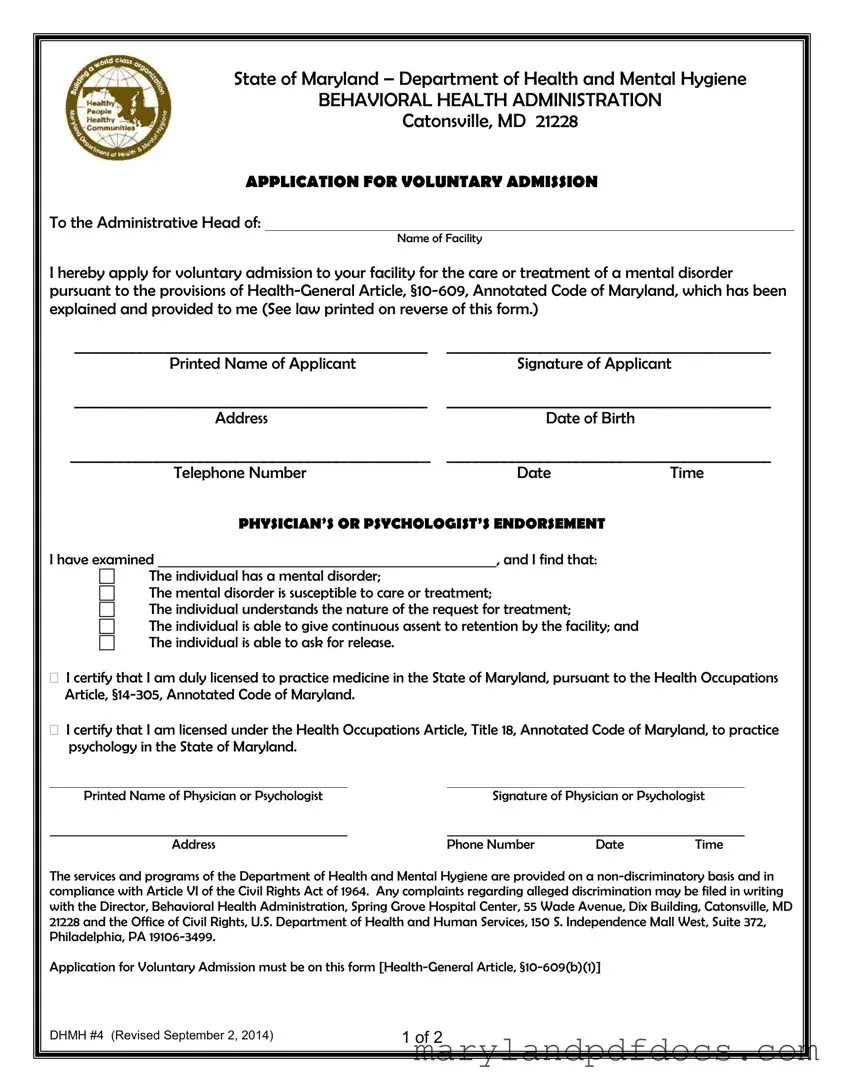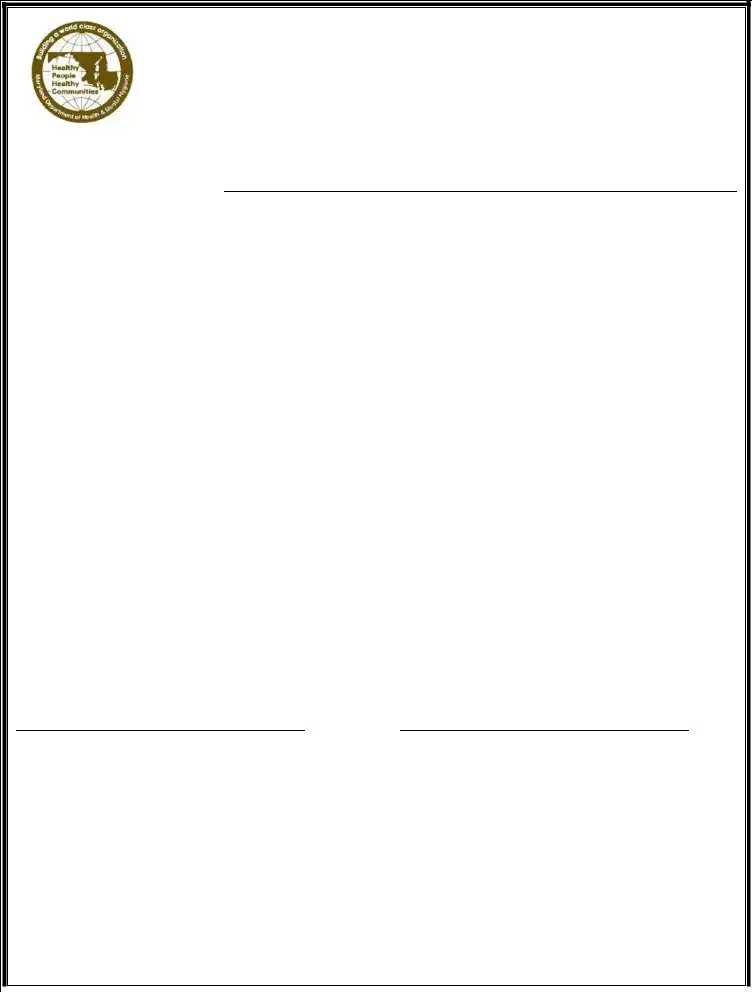State of Maryland – Department of Health and Mental Hygiene
BEHAVIORAL HEALTH ADMINISTRATION
Catonsville, MD 21228
APPLICATION FOR VOLUNTARY ADMISSION
To the Administrative Head of:
Name of Facility
I hereby apply for voluntary admission to your facility for the care or treatment of a mental disorder pursuant to the provisions of Health-General Article, §10-609, Annotated Code of Maryland, which has been explained and provided to me (See law printed on reverse of this form.)
_________________________________________________ |
_____________________________________________ |
|
Printed Name of Applicant |
|
Signature of Applicant |
_________________________________________________ |
_____________________________________________ |
|
Address |
|
Date of Birth |
|
__________________________________________________ |
_____________________________________________ |
|
Telephone Number |
|
Date |
Time |
|
PHYSICIAN’S OR PSYCHOLOGIST’S ENDORSEMENT |
|
I have examined |
|
|
, and I find that: |
|
The individual has a mental disorder;
The mental disorder is susceptible to care or treatment;
The individual understands the nature of the request for treatment;
The individual is able to give continuous assent to retention by the facility; and
The individual is able to ask for release.
I certify that I am duly licensed to practice medicine in the State of Maryland, pursuant to the Health Occupations Article, §14-305, Annotated Code of Maryland.
I certify that I am licensed under the Health Occupations Article, Title 18, Annotated Code of Maryland, to practice psychology in the State of Maryland.
Printed Name of Physician or Psychologist |
|
Signature of Physician or Psychologist |
|
|
|
|
|
Address |
|
Phone Number |
Date |
Time |
The services and programs of the Department of Health and Mental Hygiene are provided on a non-discriminatory basis and in compliance with Article VI of the Civil Rights Act of 1964. Any complaints regarding alleged discrimination may be filed in writing with the Director, Behavioral Health Administration, Spring Grove Hospital Center, 55 Wade Avenue, Dix Building, Catonsville, MD 21228 and the Office of Civil Rights, U.S. Department of Health and Human Services, 150 S. Independence Mall West, Suite 372, Philadelphia, PA 19106-3499.
Application for Voluntary Admission must be on this form [Health-General Article, §10-609(b)(1)]
|
DHMH #4 (Revised September 2, 2014) |
1 of 2 |
|
|
|
|
HEALTH-GENERAL ARTICLE
§10-609. Application by individual
(a)In general. — Application for voluntary admission of an individual to a facility may be made under this section by the individual, if the individual is 16 years old or older.
(b)Application. — The applicant shall:
(1)Submit a formal, written application that contains the personal information and is on the form required by the Administration; or
(2)Informally request admission.
(c)Admission limitations — In general. — A facility may not admit an individual under this section unless:
(1)The individual has a mental disorder;
(2)The mental disorder is susceptible to care or treatment;
(3)The individual understands the nature of the request for admission;
(4)The individual is able to give continuous assent to retention by the facility; and
(5)The individual is able to ask for release.
(d)Admission limitations — Individuals 65 or older. — (1) In addition to the limitations in subsection (c) of this section, a State facility may not admit an individual who is 65 years old or older unless a geriatric evaluation team determines that there is no available, less restrictive form of care or treatment that is adequate for the needs of the individual.
(2)If admission is denied because of the determination of the geriatric evaluation team, the team shall;
(i)Inform the individual; and
(ii)Help the individual obtain the less restrictive form of care or treatment that the geriatric evaluation team finds would be adequate for the needs of the individual.
§10-803. Voluntary admissions.
(a)Informal request. — An individual who is admitted voluntarily to a facility, on an informal request, may leave the facility at any time between 9 a.m. and 4 p.m., unless the admission status of the individual has been changed to an involuntary admission.
(b)Formal applications — An individual who has been admitted voluntarily, under a formal written application, may not be held for more than 3 days after the individual asks for release, unless the admission status of the individual has been changed to an involuntary admission.
(c)Formal applications — Minors. — A minor who has been admitted voluntarily, on the application of a parent or guardian of the minor, may not be held for more than 3 days after the applicant for the admission asks for release, unless the admission status of the minor has been changed to an involuntary admission.
|
DHMH #4 (Revised September 2, 2014) |
2 of 2 |
|
|
|
|



